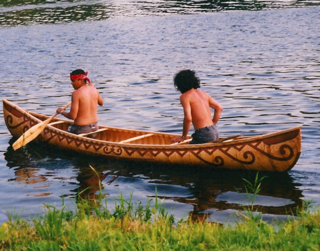
The Abenaki are an Indigenous peoples of the Northeastern Woodlands of Canada and the United States. They are an Algonquian-speaking people and part of the Wabanaki Confederacy. The Eastern Abenaki language was predominantly spoken in Maine, while the Western Abenaki language was spoken in Quebec, Vermont, and New Hampshire.
James is a common English language surname and given name:

Passamaquoddy Pleasant Point Reservation is one of two reservations of the federally recognized Passamaquoddy tribe in Washington County, Maine, United States. The population was 692 as of the 2020 census.

The Passamaquoddy are a Native American/First Nations people who live in northeastern North America. Their traditional homeland, Peskotomuhkatik, straddles the Canadian province of New Brunswick and the U.S. state of Maine in a region called Dawnland. They are one of the constituent nations of the Wabanaki Confederacy.

Saint Andrews is a town in Charlotte County, New Brunswick, Canada. The historic town is a national historic site of Canada, bearing many characteristics of a typical 18th century British colonial settlement, including the original grid layout with its market square, and the classical architecture.
The Wəlastəkwewiyik, or Maliseet, are an Algonquian-speaking First Nation of the Wabanaki Confederacy. They are the indigenous people of the Wolastoq valley and its tributaries. Their territory extends across the current borders of New Brunswick and Quebec in Canada, and parts of Maine in the United States.

Passamaquoddy Bay is an inlet of the Bay of Fundy, between the U.S. state of Maine and the Canadian province of New Brunswick, at the mouth of the St. Croix River. Most of the bay lies within Canada, with its western shore bounded by Washington County, Maine. The southernmost point is formed by West Quoddy Head on the U.S. mainland in Lubec, Maine; and runs northeasterly through Campobello Island, New Brunswick, engulfing Deer Island, New Brunswick, to the New Brunswick mainland head at L'Etete, New Brunswick in Charlotte County, New Brunswick.

The Maine House of Representatives is the lower house of the Maine Legislature. The House consists of 151 voting members and three nonvoting members. The voting members represent an equal number of districts across the state and are elected via plurality voting. The nonvoting members represent three of Maine's Native American tribes, though two tribes have declined to send representatives. Each voting member of the House represents around 9,000 citizens of the state. Because it is a part-time position, members of the Maine House of Representatives usually have outside employment as well. Members are limited to four consecutive terms of two years each, but may run again after two years.
Etchemin was a language of the Algonquian language family, spoken in early colonial times on the coast of Maine. The word Etchemin is thought to be either French alteration of an Algonquian word for 'canoe' or a translation of Skidijn, the native word for people in use by the inhabitants of the St. John, Passamaquoddy and St. Croix Rivers.

The history of New Brunswick covers the period from the arrival of the Paleo-Indians thousands of years ago to the present day. Prior to European colonization, the lands encompassing present-day New Brunswick were inhabited for millennia by the several First Nations groups, most notably the Maliseet, Mi'kmaq, and the Passamaquoddy.

Abenaki is an endangered Eastern Algonquian language of Quebec and the northern states of New England. The language has Eastern and Western forms which differ in vocabulary and phonology and are sometimes considered distinct languages.

Maliseet-Passamaquoddy is an endangered Algonquian language spoken by the Maliseet and Passamaquoddy peoples along both sides of the border between Maine in the United States and New Brunswick, Canada. The language consists of two major dialects: Maliseet, which is mainly spoken in the Saint John River Valley in New Brunswick; and Passamaquoddy, spoken mostly in the St. Croix River Valley of eastern Maine. However, the two dialects differ only slightly, mainly in accent. The indigenous people widely spoke Maliseet-Passamaquoddy in these areas until around the post-World War II era when changes in the education system and increased marriage outside of the speech community caused a large decrease in the number of children who learned or regularly used the language. As a result, in both Canada and the U.S. today, there are only 600 speakers of both dialects, and most speakers are older adults. Although the majority of younger people cannot speak the language, there is growing interest in teaching the language in community classes and in some schools.
The Apotamkin is a creature in Native American mythology. According to the mythology, it is a giant fanged sea monster that lives in the Passamaquoddy Bay and pulls people in to eat them, particularly careless children. It is said to have long red hair, and in some versions, it was a human woman before being changed into a serpent. One interpretation of Apotamkin myth is that it was used to instill fear into children to keep them from venturing into areas alone and without parental guidance.
Little River (Maine) may refer to one of the following rivers in the U.S. state of Maine:
Vera J. Francis is a Native American educator, environmental activist, and community planner for the Passamaquoddy people. She resides in Perry, Maine within the Passamaquoddy Pleasant Point Reservation (Sipayik). Francis writes and speaks frequently about environmental issues and tribal politics in newspapers, at conferences and on websites.
Donald Soctomah is a Native American author, filmmaker, historian, and politician. He serves as the tribal historic preservation officer for the Passamaquoddy tribe, where he works with both the U.S. and Canadian governments on the protection of culturally significant sites, artifacts and knowledge. Soctomah has written several books about Passamaquoddy history, as well as a children's book, Remember Me: Tomah Joseph's Gift to Franklin Delano Roosevelt and The Canoe Maker.
Rena D. Newell is the Passamaquoddy tribal representative to the Maine House of Representatives. As of February 2020, she is serving her second two-year term and is the only tribal representative in the Maine House.








